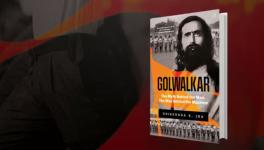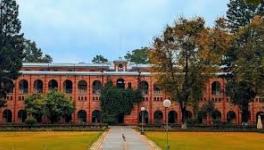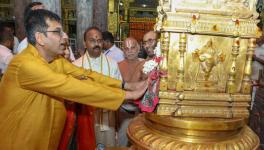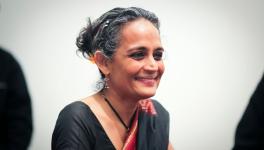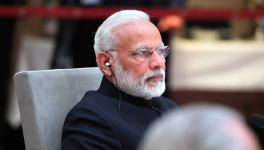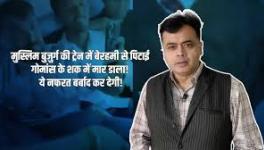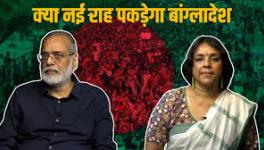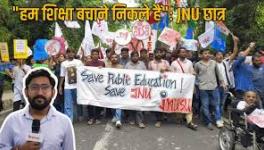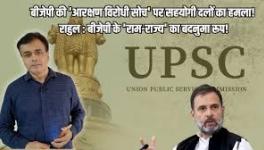Reject Hindutva, Embrace Insaniyat: Nayantara Sahgal
As Guest of Honour at the recent Hyderabad Literary Festival, Nayantara Sahgal made a strong case for continuing resistance to the Hindutvadi goal of a Hindu rashtra. Despite writers, scholars, artists film makers and scientists raising their voices over the last few months, Sahgal said, “The danger is by no means over… our fight for the freedom to write has become a much larger one connected with our lives in general.”
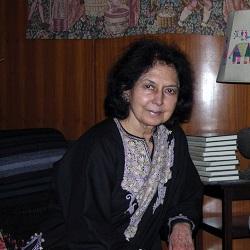
Image Courtesy: hydlitfest.org
The audience gave Sahgal a standing ovation. But as if to prove her point that resistance must continue, the Chief Guest, Governor E.S.L. Narasimhan, a former director of the Intelligence Bureau, skipped his prepared speech for a rant on “subjective dissent”. Claiming that freedom of expression is a universal right but dissent is a subjective matter that depends on “interpretation”, he likened the recent killings and polarisation to “family disputes”. His response to Sahgal’s call for resistance to attacks on Indianness was a familiar line about the greatness of our nation, home to the richest language of all, Sanskrit. Narasimhan also blamed civil society for its “double standards”, asking if civil society is “only for terrorists…”
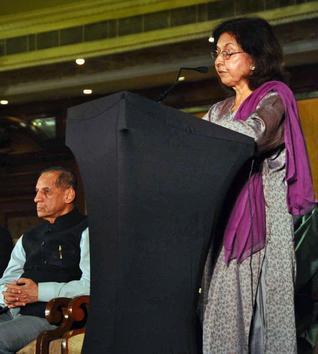
Image Courtesy:thehindu.com
Here is the full text of Nayantara Sahgal’s speech on January 8, 2016 in Hyderabad:
Let me begin by wishing us all a happier New Year than the past year has been. Last year, we had to watch a series of events that attacked our democratic right of freedom of expression and our culture of secularism. It was a dangerous trend that we could not ignore, and we did not ignore it. Many of us took action against it, and the general public reaction against this trend sounded a note of warning to those who were responsible for it. But the danger is by no means over. Just the other day I was planning to see the movie Bajirao Mastani in Dehra Dun where I live, but a bunch of people turned up at the cinema and stopped it from being shown. The same thing has happened in Mumbai and I don’t know where else. And it has happened with other movies, books, book launches, music concerts, exhibitions of paintings and so on. A gang turns up, maybe armed with sticks and stones, or black paint, or guns, and forces the closure of whatever they disagree with. It has become so usual, that apart from a small paragraph in the newspapers, nothing happens to the thugs who go on behaving this way. There have been incidents of violence against free expression before, but they didn’t have the protection of people in power. Now the attack on dissent is both official, to wipe out history and science and replace them with mythology; and unofficial, by thugs, who have gone to the extent of murdering and lynching those who disagree with them. So the question is, Are we going to let other people dictate what we should read, or look at, or listen to? In the last year and a half this has become a question we can’t ignore. This is why many writers like me returned our Sahitya Akademi Awards in protest against the murder of three writers – two of them well-known rationalists who had refused to kowtow to superstition. When these assassinations were followed by the brutal lynching of a poor blacksmith, Mohammad Akhlaq, on the excuse that he was a beef eater, the whole country was shocked and revolted. Many scientists, historians, film makers and film stars spoke up against the rising tide of hatred in the country, and the trampling of human rights. The President, and earlier the Vice President, had already spoken out against this ugliness. It was clear these were not isolated incidents. They are not just part of a fringe mentality that wants to control the way we live and think, and eat and worship. They are part and parcel of the outlook known as Hindutva whose objective is to establish a Hindu rashtra — which will divide Indians into Hindus and Others, treating all others as second-class citizens. So these incidents are an attack on our Indianness, and on the very meaning of India, which chose, at independence, to reject a religious identity, and become a secular democratic republic.
One way of raising our voices against this threat is by holding festivals of literature like this one, where writers and readers and critics can get together to discuss and debate, and agree or disagree. This way, we give public notice of the fact that writers will go on writing the stories they want to write, publishers will go on publishing them, readers will read what they wish to read, and that none of us will toe the line of those who want to make rules about how we should think, or live, or worship, and they certainly cannot tell us what we should or should not eat. Life and literature are not in separate compartments, which is why our fight for the freedom to write has become a much larger one connected with our lives in general. In the past year, we have heard strange announcements that will affect our daily lives unless we vigorously oppose them. We have been hearing that women must be home before dark, that married women must confine themselves to looking after their homes, and not work outside their homes. Apparently their job in life is to stay pregnant, since we are told that a Hindu wife should produce a certain number of children so that the Hindu population increases. We might well ask ourselves, is this for real? But what else can we think, when these fantastic statements come from leading lights of the ruling Hindutva ideology, and no one in authority has contradicted them?
Women are always the worst victims of fundamentalism, so how is such a mindset, if it is allowed to have its way, going to affect the lives of Indian women — barring the wealthy, independent upper crust, and those who are lucky enough to live in a liberal environment? We are already coping with a primitive mindset in parts of our society that forbids menstruating women, or any women, from entering temples; a mindset that aborts female foetuses, that persecutes or kills women for more dowry, that savagely punishes inter-religious or inter-caste marriages, and that calls rape the fault of the way women dress. Crimes against women are commonplace among us. Do we really need a fundamentalist mindset to make such thinking socially acceptable, and respectable? As it is, we are living in a world where the Taliban and ISIS and other fanatics are making life hell-on-earth for those who disagree with them, and reducing women to sub-human status. So we don’t need any home-grown fanatics adding their own brands of madness to the madness that already surrounds us.
Debate and dissent are part of Indian tradition, and they have never been confined to intellectuals. We have heard voices from the ground up, protesting against the Bhopal gas disaster, taking part in the Narmada Bachao Andolan, in the Chipko movement in Uttarakhand to protect the forests from destruction, on nuclear issues, and on many other issues that affect the lives of the aam-admi. And this right to dissent is particularly important today on the national level when we have to decide whether we want to go on building a modern society in the 21st century, which will remain open to knowledge and reason, or be pushed backwards into unreason, superstition, and ignorance.
Raising our voices against the backward tide has made a difference. I have noticed that Christmas was allowed to be Christmas this year and there was no nonsense about calling it “good governance day”. Gandhi Jayanti, which was reduced to Jharoo Day last year, has not quite been restored to a day of remembrance of one of the greatest men of all time – but at least Ministers wielding jharoos have not filled the TV screens. In a democracy, public opinion has a huge role to play in reversing an evil tide. And fiction and films influence public opinion, not by making political statements or polemics, but by the stories they tell and the way they tell them. The greatest of these have always involved themselves with the controversies of their times, whether these were political, social or economic. I am reminded of a film classic of the 1940s called The Great Dictator, produced and acted by Charlie Chaplin. At a time when Europe was occupied and terrorised by Hitler, Chaplin made him a ridiculous figure and a laughing stock in a hilarious comedy. We have no shortage of creative genius in our many languages and in our film world. So it is a great time for creative people to go to work — through wit, irony, satire, and sheer comedy — on all that is happening today. So let me wish us all a year of great writing. And let me end by rejecting Hindutva and wishing us all a New Year of Hindustaniat and insaniyat.
Disclaimer: The views expressed here are the author's personal views, and do not necessarily represent the views of Newsclick
Get the latest reports & analysis with people's perspective on Protests, movements & deep analytical videos, discussions of the current affairs in your Telegram app. Subscribe to NewsClick's Telegram channel & get Real-Time updates on stories, as they get published on our website.










